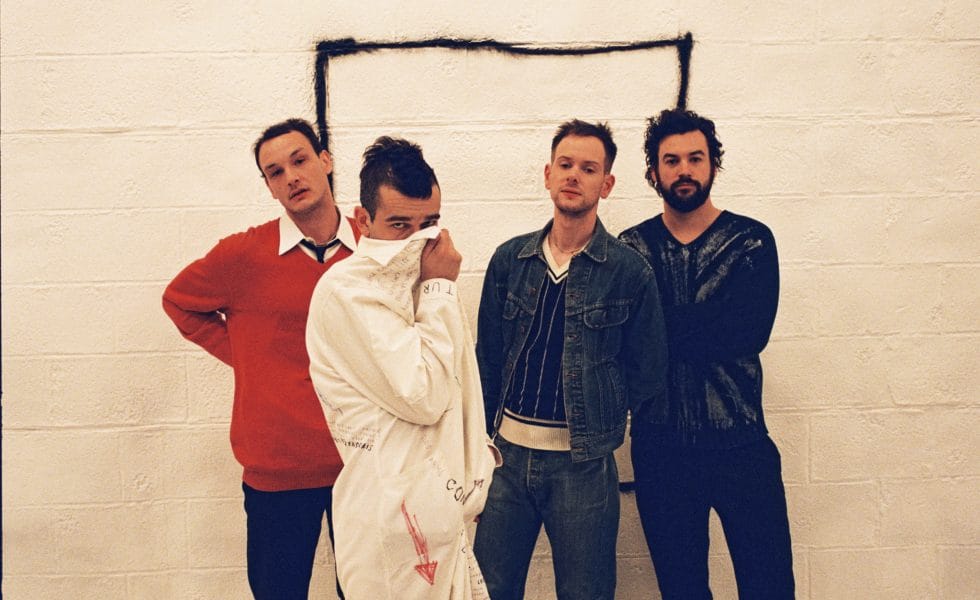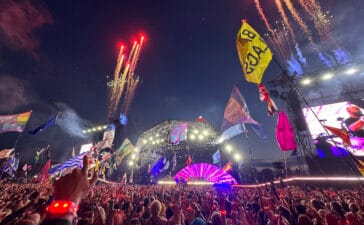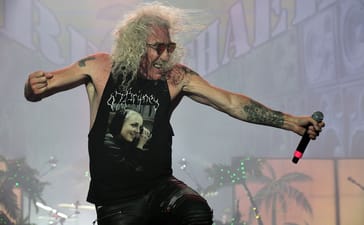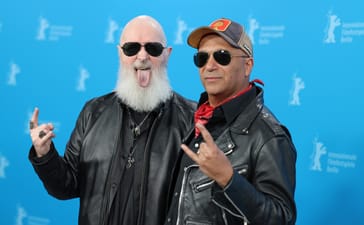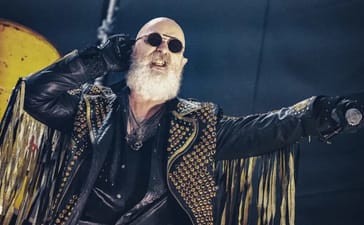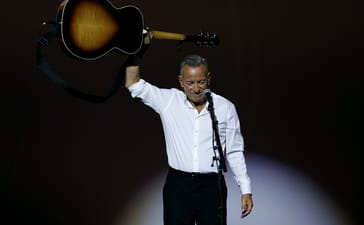Candid and reflective, Matty Healy reveals the influences behind The 1975’s latest offering Notes On A Conditional Form, while also considering the nature of both addiction and creativity.
It’s dark, freezing and late in my Melbourne living room when the phone buzzes alive and through the wonders of modern technology, I am connected to lead singer of The 1975, Matty Healy. He’s fielding calls from international media in his Northamptonshire studio, just outside of London.
The flurry of media interest is due to Notes On A Conditional Form, the twice-delayed album from the UK foursome dropping this week. It’s stunning in its scope and repeat listens reward you with sonic nuances you may not have picked up on at first. As with previous albums, Healy has exposed his bloody, beating heart through the lyrics. Though there’s the clear influence of 1970s rock reminiscent of the activist punk spirit of The Stooges, the 1980s New Romantic era also creeps into the layered synths, anthemic choruses and melancholy earnest of songs about environmental catastrophe, breaking up, addiction and existential angst.
Since 2013, when the band landed atop the UK charts upon the release of their self-titled debut, their cult appeal has kept them touring, recording, featuring on TV, in magazines and on radio. It’s an exhausting but exhilarating life to be in constant demand, while needing to constantly create and entertain.
The band were in Australia in late January and early February for Laneway Festival, though Healy was hospitalised in Brisbane when, as he shared with fans via Twitter, “things got way too vibey”. He recovered, continued and managed to bewitch Australian rock fans before travel bans dropped the curtains on live music a month later.
Their fourth release, Notes On A Conditional Form, bravely opens with Greta Thunberg’s vehement plea for action on climate change. A teenage girl’s love letter to the global ecosystem makes surprising sense here. Thereafter, the flavours of the album veer between punk protest, acoustic balladry, rhythm and blues, emo, dance and symphonic grandeur. Excessive? Perhaps it would be in the hands of amateurs, but rather, it spills out like the tendrils of an exotic plant that defies your scythe. As the various elements unfurl and intertwine, somehow it all makes for a coherent and cohesive work.
“I get addicted to music, sex, drugs or religious ideas very easily because I’m searching for contentment, for this definitive sense of self.”
“The majority of this album was made in the studio tour bus and hotel rooms with stopovers to studios to record. It’s the most deconstructed approach to an album that we’ve ever taken,” Healy says. “With the other albums, we’d tour then we’d record an album, then we’d tour and go to the studio.”
Their approach to “real time expression” on this album mimics the effect that social media has had on our lives. No longer do we take a photo and wait for it to be developed, nor write a lyric and wait months to go into a recording studio.
“We went on stage at night and did the work of a successful band, but day to day we lead very normal lives and that is reflected in the diversity and the honesty on this album.”
Whether many of us feel our lives reflect anything normal during the current COVID-19 restrictions is debatable, but performing to massive stadium audiences nightly and writing music by day isn’t normal for the majority of the world, regardless of the pandemic. Being a rockstar isn’t something Healy has found easy to navigate and many of his past media interviews have reflected the awkwardness of being a hero to young fans while also trying to maintain a personal, private existence.
“I think that addiction is so easily considered purely substance abuse, but really addiction is a behaviour. It comes from lots of different places, and I’m an addict in a way that it helps me. I’m addicted to creating, and the reason is that when I create, I feel connected to something higher. It releases me from that fear of: is this everything? I get addicted to music, sex, drugs or religious ideas very easily because I’m searching for contentment, for this definitive sense of self. I still do like taking drugs,” he admits. “I don’t take hard drugs anymore. The problem with drugs is that you need to ask if they’re helping to create. Sometimes they do for a very short period of time, but after a little while, the hard drugs I was taking didn’t give me this magical, broad perspective. They gave me just one perspective.”
Several years ago, Healy confessed his heroin addiction and the ravages it was taking on him mentally and physically to his bandmates, a tight-knit group who’d been friends since their early teenage years. He subsequently checked into a rehabilitation clinic in Barbados. Was it, I ask, to escape your everyday life?
“No. It’s because it’s a fucking long swim home,” he responds. “If I was in rehab in Essex, two weeks in I would have gone ‘fuck this man, I’m out’, but in Barbados it was such a different headspace. I didn’t wear any of my normal clothes, I just completely got rid of the ideas of who I am for a bit.”
Healy admits he still smokes weed “addictively”.
“There’s lot of bands that look back into the past and they like that look, or that sound, so they recreate that music and that look. It’s fucking cosplay. You may as well dress as Halo characters and shoot each other.”
“It’s important to me not to be a beacon of sobriety. I’m not somebody who has the answers on how to lead a clean, post-hard-drug use life,” he explains. “I don’t want to preach because I’ve got nothing to preach about. Whether it’s to temper loneliness or to like being by myself, I like being on drugs. Sex, drugs, religion and art are all forms of losing yourself. I think I’m addicted to losing myself.”
Healy and the band have long lived either together or nearby each other. His loneliness isn’t physical, though he does admit that co-dependence is an issue they may have to deal with. After 18 years living in each other’s pockets, Healy is far from complacent about how and what they produce.
“There’s lot of bands that look back into the past and they like that look, or that sound, so they recreate that music and that look. It’s fucking cosplay. You may as well dress as Halo characters and shoot each other,” says Healy. “At no point have I ever thought, ‘I can’t do that’ in music. It’s also avoiding being bored. If I was making the same music day after day with the same people I’ve known for 18 years, I’d be fucking bored.”
While some of us hit the local pub or stream Netflix when we’re bored, Healy surely trumped us with a trip to Brian Eno’s studio in London.
“It’s a place I’ve always wanted to go,” he enthuses. “Art is so important right now, you know? Music is such a democratic art form and anyone and everyone can do it. Brian talks about genius as the result of a collective rather than just one person acting alone.”
Healy’s conversation with Eno on genius and the nature of creativity is out at The Face via podcast. He’s already recorded long-form conversations with Kim Gordon, Bobby Gillespie, Mike Kinsella, Conor Oberst and Stevie Nicks.
Notes On A Conditional Form is, like Healy himself, a mashup of influences and ideas. It’s the sound of four musicians, and everyday men, seeking meaning in a fast-moving world and striving to avoid their own boredom, and ours, through art and sound. Is it addictive?
Perhaps, but only in the most wholesome way.


